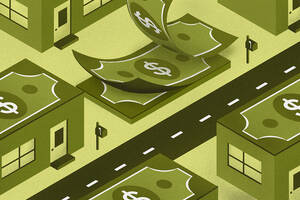Strategy Finance & Accounting Economics Policy Jul 1, 2008
Professional Forecasters
Innocent until proven strategic
Imagine you are the chief operating officer for a Fortune 500 technology company and you have to sign off on a major pricing increase for your firm’s best-selling product line in two days. All the internal data you have—labor costs, product sales/growth trends, competitors’ and vendors’ anticipated pricing—support the price increase. But you are still hesitant. Then, perusing Business Week on the morning train, you come across an “Investment Outlook” article. Your eyes widen. It’s filled with predictions by professional economic forecasters like this one: “Better pricing trends will keep corporate profits better than expected but also greatly heighten inflation fears next year.” Now you’re relieved, confident that the price increase is the right course to take. After all, professional forecasters have no incentive to distort their predictions.
Or do they?
In their article “The Strategy of Professional Forecasting” (Journal of Financial Economics, 2006), Marco Ottaviani, a Kellogg faculty member in the Department of Management and Strategy, and his co-author Peter Sørensen consider that exact question. They investigate how forecasters’ professional incentives sometimes motivate departures from their clients’ best interests—namely, making the most truthful predictions they can.
Professional forecasters, typically highly compensated employees of financial companies or heads of their own independent forecasting firms, play a crucial role in shaping corporations’ and individuals’ decision-making: firms decide whether they should hire workers based on their prospects for future demand and choose their financing strategies using projected long-term interest rates; high-net-worth investors take expected economic trends (e.g., inflation, bond rates) into account to place big bets. In short, forecasters’ words—and numbers—have major influence on the decisions, and ultimately the fortunes, of many.
Guided Guesses
But how do these “profits prophets” form their expectations? By definition, professional forecasters must guess the future. Hence, one may think that they would maximize the accuracy of their reports by making the most truthful predictions they can. As previous research has argued, financial analysts’ projections should be truthful because their livelihood depends on their accuracy. And a glance at the significant dispersion among economic pundits’ predictions for major economic indexes year after year suggests that they are indeed using private information and personal expectations to make their guesses. It also reveals that they are rarely “right,” as can be shown by a simple plot of the GDP growth forecasts against the actual GDP growth rate (see Figure 1).
Figure 1: Real GDP growth rate forecasts versus actual rates
No one expects forecasters to be consistently on the money, but there is an implicit assumption that they are being truthful. As Ottaviani and Sørensen suggest, “Forecasters are presumed honest, unless proven strategic.” And that is where it gets tricky, largely because professional forecasters are paid, and accorded fame, based on their reputation and not necessarily the actual accuracy of their predictions. That is, the more they are perceived as having superior future-gazing skills or knowledge about the economy, the more money—and fame—they get. As such, rather than telling people what they really know, forecasters may be tempted to manipulate their predictions strategically to enhance their reputations and accompanying cash and celebrity.
No one expects forecasters to be consistently on the money, but there is an implicit assumption that they are being truthful.Specifically, Ottaviani and Sørensen argue that some forecasters may have incentive to shift their forecasts more toward the established consensus on specific indicators to avoid unfavorable publicity when wrong, while others might exaggerate their true predictions with the hope of standing out from the forecaster crowd in certain contexts. The researchers analyze the forces that drive these strategic incentives by developing two theories, the reputational cheap talk theory and the forecasting contest theory, and they consider empirical evidence for each.
Reputational Cheap Talk Theory
The reputational cheap talk theory posits that forecasters aim to appear well informed. A natural question, then, is why forecasters would not fully disclose what they know or believe; after all, by making the right predictions forecasters stand only to improve their reputations. To answer this question, first note that everyone, market participants and forecasters alike, shares knowledge of some public information, whether CNN headlines, Financial Times articles, or others. This common information creates baseline expectations regarding several economic variables. More importantly, these baseline expectations usually point in the right direction. But professional forecasters should be able to improve upon common knowledge because they have access to more precise information about the economy’s state, allowing them to combine what everybody knows (public information) with what they alone know (private information) to generate their personal predictions. As such, forecasters’ personal predictions typically fall between public and private beliefs—deviating from public expectations based on their private information, but not as exaggerated as their private information might be because they take public information into account. If forecasters were not strategic, they would honestly report their personal predictions. Market participants would then be right to take these forecasts at face value.
However, if the market believes that forecasters are honest and rewards them based on their reputation for accuracy, will the forecasters be content to honestly report their personal predictions? Taking into account all the information they have, forecasters expect their personal predictions to be correct. To convince the market that their private information is accurate, however, they would like the market to believe that their private information is located at their personal prediction. In other words, if forecasters can convince the market that their predictions are based fully on private information, they would be considered even better informed than they really are. Consequently, forecasters have strong incentive to confirm original market beliefs by making predictions closer to the market consensus than what they truly believe. If so, the market’s original belief that forecasters report honestly their personal predictions is not consistent with the actual behavior of the forecasters.
If the market is fully rational, it will be able to anticipate that forecasters are distorting their predictions to pretend to be more informed than they really are. As a consequence, the market can only trust forecasters to communicate part of the information they have. As Ottaviani and Sørensen point out, “Paradoxically, the desire of analysts to be perceived as good forecasters turns them into poor forecasters.” In line with this, the authors also note a report in The Economist on the “surprisingly good performance of a sample of London garbage men in forecasting key economic variables.” Presumably the garbage men were free of reputation-focused incentives.
Forecasting Contest Theory
In contrast, the forecasting contest theory makes the completely opposite prediction: that forecasters have an incentive to distance themselves from market consensus. Indeed, if forecasters predict extreme events and happen to be right, their reputation will skyrocket; if they merely repeat what everybody else is already saying, they stand to gain little, even when they are right. As the theory’s name implies, this behavior results largely from high-profile public forecaster competitions such as the Wall Street Journal’s “Forecasting Survey” (macroeconomics) and “All-Star Analysts” (earnings), which feature write-ups for winning forecasters. Other such rankings and contests appear online (e.g., www.valididea.com, www.bigtipper.com), and some include monetary prizes. Without a doubt, forecasters stand to gain much-enhanced reputations by winning or placing in such contests. As Ottaviani and Sørensen note, “it is easier for people to keep in mind who is an ‘all-star’ analyst, or who came in first in a contest, than specific details about forecast accuracy.”
Indeed, forecasting contests, rather than focusing on each forecaster’s prediction and its eventual distance from the actual economic indicator in question, tend to report only the relative accuracy of different forecasters, usually a ranking of forecasters by level of accuracy. In many cases the report will not even include forecasters who did not place. In this context, forecasters have incentive to differentiate themselves from competitors by putting greater weight on their private information, potentially enjoying major reputation gains when they guess right. Therefore, their contest-related predictions tend to be exaggerated toward those suggested by their private information (i.e., including little if any public information). In support of this, Ottaviani and Sørensen point to empirical evidence that financial analysts releasing late earnings forecasts “tend to overshoot the consensus forecast in the direction of their private information.”
In sum, the reputational cheap talk theory should be more relevant if forecasters focus on their absolute reputations—that is, how accurate their predictions are compared to actual economic indicators. Here forecasters would be expected to align their predictions more closely with publicly available information. In contrast, if forecasters attend more fully to their relative reputations, as if they were competing in contests that generate rankings, they will behave in line with forecasting contest theory and tend to exaggerate predictions in the direction of their private information. So which of these theories better explains the actual picture in professional forecasting? Although certainly not definitive, recent studies show a strong tendency toward exaggerated forecasts, in line with the forecasting contest theory.
Rather than prescribing how forecasters should make their predictions, Ottaviani and Sørensen provide a framework that helps us interpret forecasters’ predictions, urging us to recognize that these professionals have specific incentives to depart from their private guesses in their public predictions. Armed with these insights, perhaps we as the public may be able to generate more accurate private guesses of our own.
Marco Ottaviani and Peter Norman Sørensen (2006), “The Strategy of Professional Forecasting,” Journal of Financial Economics, August 2006, 81(2), 441–466


